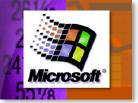|
Japan scolds Microsoft
|
 |
November 20, 1998: 12:50 p.m. ET
Office software, not Internet browser, center of anti-competition claims
|
NEW YORK (CNNfn) - Embattled software giant Microsoft Corp. got some legal relief from across the Pacific Friday as Japan's antitrust watchdog closed an investigation on Microsoft's business practices.
The Japanese Fair Trade Commission (JFTC) ended its 11-month probe with only a pro forma warning for Microsoft and a recommendation that the company continue to give computer manufacturers a choice in which software to install.
"The warning was simply a routine notice that they had spent a lot of time and trouble investigating us, so don't do these things in the future," Microsoft General Counsel for International Affairs Brad Smith told CNNfn.
"A warning simply means that the JFTC started an investigation with suspicion about an allegation, but found no substantial evidence of improper conduct," said Masaru Kitamura, a lawyer who has represented the JFTC in the past.
The JFTC also found no grounds for claims that Microsoft had stifled competition in the Internet browser market.
Similar allegations are at the center of the current antitrust action brought against Microsoft by the U.S. Department of Justice and 20 state attorneys general.
The issue with Office
Unlike the U.S. case, the JFTC´s major concern was not so much with browsers but with the way Microsoft bundles its popular Office family of software applications.
Microsoft offers Office programs to Japanese computer makers in two major formats: The full Japanese-language Office suite and a smaller bundle comprising only word processing program Microsoft Word and spreadsheet maker Excel.
According to concerns raised by Japanese software maker JustSystem Corp., the smaller bundle competed unfairly with similar suites of office programs, triggering a January JFTC raid on Microsoft's Tokyo offices.
In particular, the JFTC investigation concerned Microsoft's practice of negotiating with Japanese computer makers to pre-install Office, effectively making it the default document creation software.
In the past, Japanese industry insiders have alleged that Microsoft threatened to deny Japanese computer makers the market-dominating Windows 95 operating system unless they also installed Office, but the JFTC did not comment on these claims.
The agency likewise found no grounds for reports that the company had insisted that computer makers not install competing software - including the JustSystem bundle - on machines that already contained Word or Excel.
Microsoft´s Brad Smith said that the company had "resolved all issues raised by the JFTC" by offering Excel on a stand-alone basis, making it easier for computer makers to pick and choose between competing software.
However, he said, no Japanese computer maker has bothered to take the company up on the offer.
The JFTC singled out Excel as a potentially offending product, Smith told CNNfn, because Japanese competitors viewed the spreadsheet as the major threat when the investigation was launched.
Microsoft's global struggle
In the last year, Microsoft has come under legal scrutiny worldwide, with governments ranging from Japan to Brazil opening the books on the company's business practices.
However, Smith said the Japanese ruling indicates that the company may yet come out of the legal maelstrom reasonably unscathed.
"We are actually optimistic" that an Israeli antitrust case similar to the U.S. browser suit will be resolved in the near future, he told CNNfn.
Israel's Antitrust Authority began its Microsoft scrutiny in late 1997 when the agency responded to complaints by determining whether the company should be declared a monopoly.
According to Smith, these complaints focused on the Internet browser raised -- as they been worldwide, he said -- by competitor Netscape Communications.
Likewise, South Korea's Fair Trade Commission found no evidence that Microsoft had broken any laws on the browser front.
"The Korean investigation was very quiet, they didn't even put out a press release," Smith said. "All they did was notify us privately."
The European Union´s antitrust agency, the European Commission, initially pursued its own investigation as well, but took a back seat to the U.S. authorities in May.
"We have left the floor to the American authorities not because we're not interested, but because the United States has a greater ability to act," Commission spokesman Stefan Rating said.
On the horizon, Microsoft´s Smith told CNNfn that he looks forward to the amicable settlement of a Brazilian Ministry of Justice probe into the legality of Microsoft Office.
"That one was actually more concerned with MS Money," he said. "It's not as far along as the others because they started later, but we're optimistic that they'll clear it up in the near future."
Brazil launched the investigation in late spring over allegations that Microsoft had unfairly hurt local software company Paiva Piovesan by giving MS Money away to banks as well as packaging it with Office.
Despite Smith's enthusiasm, Microsoft stock (MSFT) was trading flat by mid-morning Friday, down 1/8 at 111-5/8. Netscape stock (NSCP) was up 5/16 at 36-7/8. 
-- by staff writer Robert Scott Martin
|
|
|
|
|
 |

|

